Exclusive conversation with the funk pioneer himself, from Sly & the Family Stone to Graham Central Station and beyond!
Exclusive interview with FBPO’s Jon Liebman
October 1, 2012
Larry Graham is one of the most influential bass players in the world. In addition to having been the bassist for the ’60s supergroup Sly & the Family Stone, Larry has led his own band, Graham Central Station, for the past forty years. Larry is especially revered by funk bass players, as he is credited for developing the wildly popular “slap bass” technique.
FBPO: How about if we start from the beginning? I read that before you ever picked up a bass, you were into tap dancing, you played the drums and all kinds of other interesting stuff.
LG: Tap dancing came first and that didn’t really last too long! I started taking piano lessons at a very young age and I did that for years. I played clarinet and saxophone in school and I played drums in the school orchestra, as well as the marching band.
When I was 11, my father, who was a guitarist, gave me his guitar. He said he wasn’t going to play any more, so he gave it to me and I taught myself how to play. When my mother and I started working together—she was a pianist and vocalist, as well—I was just about 15. I was playing guitar and she was on piano and we had a drummer. We were called the Dell Graham Trio and we did a lot of nightclubs and lounges, mostly in the Bay Area.
This one club that we worked at had an organ that had the bass pedals that go halfway across the bottom, so I learned how to play the bass at the same time I was playing the guitar. That didn’t last too long because the organ broke down. We had gotten used to having it and we didn’t really want to go back to just guitar. I went and rented a St. George bass from this place in California. I rented it because I figured that as soon as the organ was repaired, I would go back to my guitar because that was my first love. But that didn’t happen. The organ was never repaired, so I basically got stuck on the bass.
Then my mother decided that she wanted to be just a duo, to have me on bass with no drums. That’s when I started to pluck the strings to make up for not having that bass drum and that back beat. That’s how the style came about, and that’s basically what I was doing from the time I was 15 until I was with Sly & the Family Stone. It was through Sly & the Family Stone that my style of playing became popular.
 FBPO: Regarding the technique most of us know as “slapping” — I believe you call it “thumping” and “plucking” — there’s a sense that maybe the story had gotten glorified over the years, but the more I talk to you and the more I get to know you, the more apparent it becomes that it hasn’t been glorified at all! You must have been asked a million times in your career, but is that how it all came about? That story you just told me?
FBPO: Regarding the technique most of us know as “slapping” — I believe you call it “thumping” and “plucking” — there’s a sense that maybe the story had gotten glorified over the years, but the more I talk to you and the more I get to know you, the more apparent it becomes that it hasn’t been glorified at all! You must have been asked a million times in your career, but is that how it all came about? That story you just told me?
LG: It came about out of necessity. I wasn’t trying to invent something new. I didn’t really think I was, actually. The only reason I started playing like that and not the regular overhand style was because I was thinking that the bass thing was only temporary. I just played it the way it was necessary for me to do.
FBPO: Tell me about the Sly & the Family Stone experience. How did you get involved in that?
LG: When you play in nightclubs and lounges, a lot of times you get regulars. My mother and I would have regulars who would come to see us quite often. So we were playing at this club in San Francisco on the corner of Haight and Ashbury…
FBPO: A very famous intersection!
LG: Right on the corner! The place was called Relax with Yvonne on that very famous street corner. This lady used to come in and, we found this story out later, but she’d come in and hear my mother and me, but she was also a fan of Sly’s, who was a pretty popular disc jockey at the time. So she found out that he was going to be starting a band and she took it upon herself to start calling him down to the station and telling him that there was this bass player down there and he had to hear this bass player. She finally got him to come down there and when he heard me doing my style of playing, he asked me about joining his band. The band didn’t have a name at the time, but he asked me if I’d join the band and that’s how that started. We started rehearsing and then doing gigs around the Bay and then we put out our first record.
FBPO: And you were with that band for how long?
LG: Until I started Graham Central Station in about ’72.
FBPO: When did you join Sly’s band?
LG: That would be the mid-sixties.
FBPO: You’ve got to have at least one really good Sly Stone story you can share with us.
LG: Oh, the best one was Woodstock! Playing for half a million people. It doesn’t get any better than that! That’s the most exciting experience I can think of as a musician. We would play a medley of songs, one song going right into the next. Sometimes the audience wouldn’t get a chance to react until we would finally stop after several songs in a row. Up to that point, we had never heard the roar of half a million people shouting their approval of what they’d just heard. I kind of liken it to the first time Michael Jordan took off from the free-throw line. That was a real turning point for me.

With FBPO’s Jon Liebman, NAMM Show, 2011
FBPO: How does it feel to have five hundred thousand people roaring their approval for you?
LG: It took us into a whole other musical zone because we had never experienced anything close to that. Probably most bands that were there had never experienced anything like that either. Plus, we played at night, so you really couldn’t see all the people. We really didn’t get that rush of adrenaline coming from the crowd until we stopped that first medley. It took us into another zone, musically.
FBPO: Do you still keep in touch with Sly? Last I had heard he’d fallen on some hard times.
LG: I haven’t been able to keep up with him but I’ve been able to keep up with most of the band members. In fact, Jerry (Martini) and Cynthia (Robinson) have worked with me in my band, Graham Central Station, a number of times. And Rose (Stone), too. In fact, for the show we did in Aruba, the Sinbad HBO special, Jerry and Cynthia and Rose were on that show with me. Sometimes Greg Errico would sit in with us too, so we had as many as five of us on the stage together. We’ve kept in touch over the years. I just haven’t really been able to keep in touch with Sly, though.
FBPO: Tell me about Graham Central Station. How did you go about putting that band together? What were you trying to say?
LG: In the beginning, it was really built around the girl vocalist, Patrice Banks. We called her Chocolate, so we called the group Hot Chocolate. I was intending to be the writer and producer of the group. One night they were doing a gig at this nightclub in San Francisco called Bimbo’s and I knew the music well that the band was playing because I wrote and arranged a bunch of it. Towards the end, with the urges of the crowd and everything, I ended up going on and playing with the band and I guess something happened that night. It was like we all knew that something had just happened there and it ended up being my band, with me just replacing the bass player.
FBPO: You did quite a bit of work with Prince too. Tell me about that.
LG: Well, Sinbad took several people from the festival and made a tour out of it, mainly Graham Central Station, Earth, Wind & Fire, Tia Marie, himself and one other comedian. We were playing at the amphitheater one night about fourteen or fifteen years ago in Nashville, Tennessee, and Prince was playing the same night. He heard that I was in town and he invited me over to his aftershow after we both finished playing.
We had never played together before, but we had met briefly years ago in passing at a Warner Bros. picnic. What I didn’t know that night is that he was basically raised on my music. He was heavily influenced by Graham Central Station and then he went back and got into some Sly & the Family Stone. But when Graham Central Station came along, he was older and more into his writing and stuff like that. When we got up there and jammed together, it was like we had been playing together forever!
We immediately hit it off musically and then he asked me after I finished with the Sinbad tour, would I like to join his tour. So that’s how that relationship started. After doing that tour for a while, my family was living in Jamaica for seven years, but we were getting ready to move back to the States, to California, but we ended up moving to Minnesota instead, so then we became best friends and then like family.
FBPO: I understand you also teamed up with Eddie Murphy for a while. What was that all about?
LG: Well, Eddie put together a group called Psychedelic Psoul and did a tour and did some gigs in the United States. He did an album with Michael Jackson and we did the video for that in Jamaica. When I was living there, Eddie would come over from time to time with the family. Following the release of the record, we went and did some U.S. dates and then some dates in Europe. We did the Montreux Jazz Festival… That’s basically what that was. It was a musical group. He wasn’t doing comedy or anything. He was just sticking to music.

Larry Graham & Graham Central Station
FBPO: It’s great to see you still actively recording and touring. Tell me about the new album, Raise Up.
LG: Well, I really like it. I’m really happy about it.
FBPO: I like it, too. You’ve got your funky bass playing, your sexy crooning, your great horn parts and all that stuff!
LG: Thank you, thank you. I just took my time. I wasn’t in a rush and put together this collection of songs over the years. Obviously, I write all the time. You never stop doing that. It’s like people who paint pictures. You might not see everything they paint, but they never stop painting.
I’m always being creative, but of all the things that I wrote and really liked, the things that worked together and fit together to make the complete story, that’s what this collection of songs is. It’s intended to raise you up. When you listen to it, it’ll make you feel better, just like we do at our shows. I try to carry that feeling over the CD as well, so that it does raise your spirits, so that it does make you feel better. Everybody has to deal with so much all of the time anyways and some of it will get you down. Some people will grab a good album or something that they really like to lift their spirits up.
FBPO: It’s a great band, too! I had the privilege of seeing you and hearing you at Bass Player Live! last year.
LG: Thank you! They’re all out of Oakland, California, which is my original home.
FBPO: How’s the tour going?
LG: Good! It’s going really well. The band, since they all live very close to one another, are all good friends as well, so everyone gets along really well. That makes it fun to tour when it’s like that. We don’t have any weirdness going on. I think when you’re happy like that, it just comes out in the music.
FBPO: What about the future, Larry? You’ve already contributed so much to the music world and to our culture, not the least of which was for bass players! What else would you like to do that you haven’t already accomplished?
LG: I’d like to keep making music, for sure. I’d like to keep sharing the gift that’s been given to me, keep sharing it with other people, whether it be on an album or live, because I really enjoy both.
FBPO: What would you be if you were not a bass player?
LG: I’m really into the Scriptures. I read and study the Bible on a regular basis and I try to let it influence my life as much as possible and influence everything that I do. Outside of music, I guess I would just be doing that.
Photos by Erich Francois (with the exception of photo of Larry with Jon Liebman)
Larry’s newest CD, Raise Up, may be purchased here:
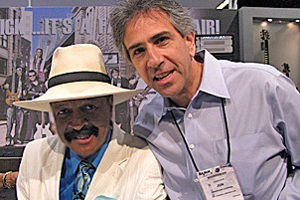


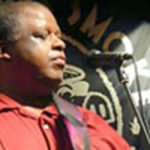
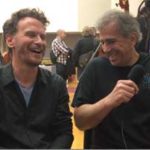
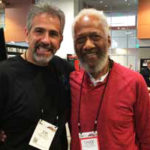
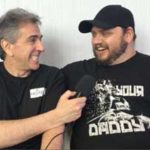

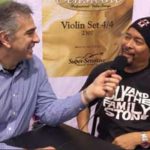

Great Interview.